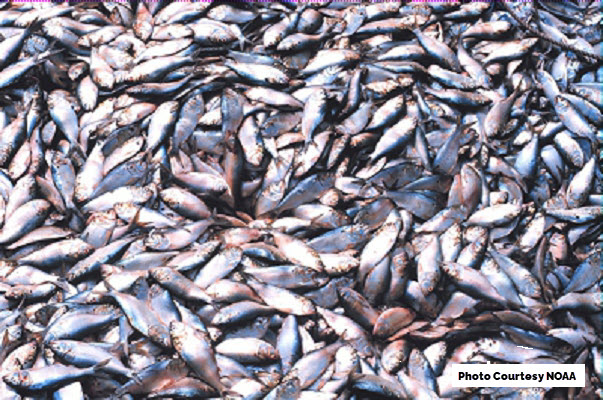
Reduction fishing is an enduring holdover from the catastrophic industrialized wildlife slaughter of our past. Atlantic Menhaden was initially targeted in the 1800s as a source of oil when the might of the whaling industry in America collapsed the worldwide whale population. The productivity of our nearshore coastal waters has never reached its potential since.
The two main products derived from Menhaden today are industrial fish meal and fish oil. Annually, over 1.8 billion wild Menhaden are caught on America’s Atlantic and Gulf Coasts to make these products.
The Industry Today
One multi-national conglomerate based in Canada, Cooke Inc., controls the vast majority of the American reduction fishing industry. This $3 billion vertically integrated business manages wild-caught fishing fleets, masses of industrial fish farming operations, and reduction, processing, and packing plants across the globe. Only one smaller reduction competitor on the Gulf Coast, Daybrook Industries, remains in America. Omega Protein® , Cooke’s recently purchased ($500 million) wholly-owned subsidiary, worked diligently for decades to purchase, consolidate, and modernize the industry. There used to be dozens of small local reduction fleets and plants, but now there are only four large facilities left: two in Louisiana, one in Mississippi, and one in Virginia. Cooke Inc. and Omega Protein® maintain a one-company monopoly on the Atlantic Coast. https://cookeseafood.com/about-cooke/
The Process of Catching Menhaden
Squadrons of spotter aircraft track multi-ton schools of Menhaden, which are then pursued by fleets of industrial fishing ships working in teams to deploy 1,500-foot-long purse-seine nets. Once caught, the net compresses the Menhaden into a massive ball until they all suffocate. Subsequently, they are vacuumed onto the ships, where their entrails, feces, and urine are squeezed out. When returned to the shore, their remains are piped into the reduction process plant, ground up, cooked, and processed into fish meal or fish oil. Only 1/3 of the biomass caught is converted into a usable product, while the rest is waste.
Menhaden are Not a Food Source for Humans
While marine species depend on eating this extremely oily, boned-filled, protein-packed fish to survive, they are not palatable to human beings. Reduction industry manufacturers produce a final product primarily used as feed for industrial farming operations worldwide, including fish (salmon), hog, chicken, and cattle. Most of the rest become cheap fillers for popular pet foods like IAMS (Mars, Inc.) and Purina (Nestle, Inc.) or as ingredients in manufactured products like cosmetics and household goods.
Omega 3 Supplements
There is also the feel-good story about how fish oil derived from Menhaden produces Omega-3 supplements for the benefit of humans. But fish oil pills are, at best, a microscopic fraction of what the industry produces, and multiple recent large-scale medical studies have shown almost no health benefits from trying to boost your Omega 3 levels with a supplement regimen. https://www.washingtonpost.com/wellness/2023/08/23/fish-oil-supplements-heart-benefits/
It is way past time to curtail this ecosystem-disruptive industry.
"40 Wild-Caught Menhaden are needed to raise 1 Farmed Salmon."
Americans have stood up and stopped the wholesale industrialized killing of wild species before, including whales, fur seals, buffalo, beaver, waterfowl, migratory birds, and dozens of others. It must ban this practice in our near-shore state coastal waters.
Federal waters start at 3 miles offshore. The regulatory agencies, the fishery certification organizations, and the reduction companies themselves all say there are billions of menhaden to be found in the ocean, and we are just asking them to do their fishing there. They currently take at least 40% of their catch in the ocean. Reduction fleets around the globe fish in the ocean daily, including in extreme places like Antarctica. We ask reduction fishing fleets to do the same.
